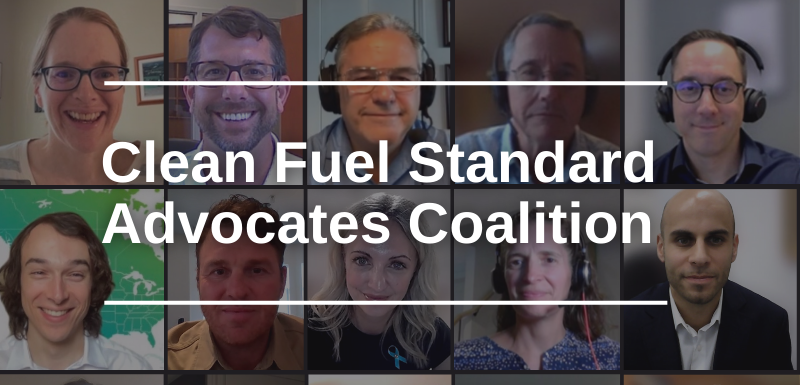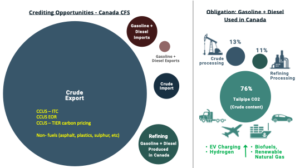Clean Fuel Standard Advocates Coalition

Projects Sponsor
As Canada’s largest GHG emissions sector, transportation is one of the most important and challenging areas to decarbonize. A big step towards doing that was taken in July 2022, when Canada published the Clean Fuels Regulation (CFR). The CFR is a key policy that promises to play an indispensable role in reducing transportation GHG. The final regulation was significantly strengthened through six years of efforts by an unprecedented coalition of ENGOs and clean fuel trade associations, the Clean Fuel Standard Advocates (CFSA). The CFSA’s innovative, tenacious, audacious approach to gaining Industrial and fossil fuel sector support resulted in a more ambitious target with fewer loopholes than many had hoped for.
It takes a village to raise the bar.

The initial drafts of the Clean Fuels Regulation, or CFS, including the draft regulation published in December 2020, had weak targets and major loopholes that severely compromised the government’s GHG reduction goals. This presented a challenge to clean fuel advocates.
They knew that strengthening the standard would encounter substantial opposition, both within and outside the government. They knew that no one advocate (NGO or trade association) had the resources or influence to single-handedly champion a more stringent standard. They knew as well that the regulation’s complexity would deter otherwise-concerned entities from stepping up. They concluded that participating via a ‘smart’ virtual organisation was their best hope for success.
The organisation they put together had a tremendous amount of knowledge and experience and theirs was a 6-year effort, beginning in early 2016 when three of the core CFSA members – Advanced Biofuels Canada, Pembina Institute, and Clean Energy Canada – met in Ottawa to discuss the opportunity for a national coalition of organisations who would actively advocate for a federal clean fuel standard.
These organisations engaged politically to explore this idea and also reached out to allied organisations to gauge interest. The coalition was ready when, in August 2016, the federal government quietly notified the fossil fuel industry of the intent to regulate carbon intensity of fuels. In early November 2016, approximately 15 organisations attended an all-day clean fuels standard orientation meeting in Ottawa for federal and provincial government staff, and a formal coalition was launched: CFS Advocates. Terms of Reference and a Coordinating Committee were established, with each association or organisation explicitly signing on to the ToR. The CFSA sought out improbable allies – notably, energy-intensive and trade-exposed sectors and obligated parties. Dialogue facilitated by the CFSA allowed competitor sectors (EV, biofuels, hydrogen, biogas, etc) to share data and educate each other, guided by a philosophy of ‘collaborate now, compete later.’
This helped dampen some opposition as did consciously engaging across the full political spectrum. After all, when it comes to climate change we are all stakeholders. Key media contacts were also cultivated, with the result that global energy/climate stakeholders were informed about the coalition’s issues. Reuters, Globe and Mail, National Observer, and others published very effective pieces that helped gain CFSA’s cause and position visibility. Supportive politicians were likewise briefed frequently, filling in potential knowledge gaps and helping to get and keep the issue on the radar. CFSA supported this advocacy with third-party research and modelling to demonstrate the impact of select design changes being recommended to ECCC.

In 2021, the CFSA Coalition benefited from a Conservative Party of Canada election campaign platform which promised to implement a BC-style LCFS. This created space for the Liberal Party to revisit its approach to the policy. Interestingly, in the latter stage of the campaign, once CFSA had brought a wide range of industry parties on board, their biggest obstacle came from within the government. Political considerations, as well as the long six-year trajectory of the policy’s development, created considerable inertia that needed to be overcome. The complementarity of the CFS to other climate measures—notably the enhanced federal commitment to carbon pricing up to $170 per tonne—needed to be reiterated and reaffirmed by a wide range of policy- and decision-makers. The breadth of the coalition, combined with a ramping up of government relations and media efforts, was critical to success at this stage. Fortunately the CFSA, birds of all different feathers had all their ducks in a row.
The CFSA’s work had a distinct impact on the CFS effectiveness. These included the partitioning of the CFS coverage to have separate obligations in the Liquids class, from those in the Gaseous and Solids class and assignment of 76% of the overall 30Mt target to the Liquids class. A credit trading platform was added to strengthen the market position for non-fossil clean fuels, as well ‘additionality requirements’ for generating credits from fossil fuel-based projects were strengthened. Caps on flexibilities that reduce demand for non-fossil clean fuels were introduced, and exported credits from ‘clean’ fossil fuel projects were eliminated. The CFS targets were increased, first in June 2020, and again in March 2022. While the CFSA’s accomplishments are impressive and inspiring to date. The best may be yet to come. The solutions-oriented channels for dialogue and respectful relationships with such a wide variety of key stakeholders to climate action have been opened.
Perhaps the most important lesson we can take from their work is that it takes a village to raise the bar.













